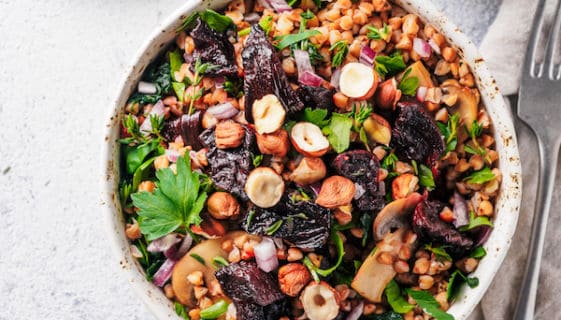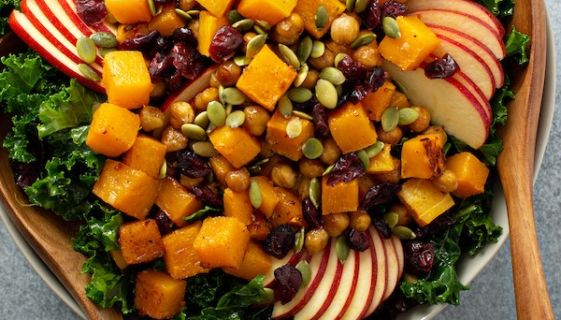Our Asian-inspired coleslaw is a delicious, fun, and healthful way to consume many rainbow colors. Different colors in plants indicate different nutrients—all of which are important for a healthy diet. When we combine green (broccoli, mint, scallions), purple (cabbage), red (bell pepper), orange/yellow (carrots, ginger), and white (garlic), we create a tasty dish that provides a whole-body health boost.
This crunchy coleslaw is full of mouthwatering tastes and textures. It is light, nourishing, and refreshing. The miso-peanut sauce rounds out the umami, nutty flavors. Adding edamame provides a subtle sweet flavor and plenty of plant-based protein. This recipe can come together in as little as 30 minutes and will stay in the fridge for up to 3 days. It is a great dish for gatherings, barbecues, a light lunch, or a tasty side to complete any meal.
For the best texture in coleslaw, it is preferable to shred the cabbage, carrots, and broccoli stems using a box grater or a manaline or pulse them in a food processor.
Miso-Peanut Rainbow Coleslaw
Serves: 4 as a main dish and 8-10 as a side
Ingredients
Coleslaw
- 3 cups purple/red cabbage, shredded (about ½ a medium head of cabbage)
-
- You can use a mix of red and green cabbage if you like
- 1 cup raw broccoli florets, chopped
- ½ cup raw broccoli stems, shredded
- 1 red bell pepper, thinly sliced
- 1 cup carrots, shredded (about 2 carrots)
- 4 scallions, thinly sliced
- ½ cup mint leaves, chopped
- ¼ cup toasted sesame seeds (you can replace them with roasted peanuts or walnuts or toasted sunflower seeds)
- 1-2 cups shelled edamame
-
- I buy frozen shelled edamame and allow it to thaw in the refrigerator, or you can run hot water over it.
Miso-Peanut Sauce
This sauce is also great for dipping summer rolls, veggies, tofu, chicken, or fish skewers.
- ¼ cup toasted sesame oil
- ¼ cup rice vinegar
- ¼ cup smooth peanut butter (you can replace it with a different nut or seed butter)
- 1 tbsp miso paste
- 1 tbsp soy sauce or tamari
- 1 tbsp honey or maple syrup
- 1 garlic clove, minced
- 1 tbsp fresh ginger, grated (about a 2-3 inch piece)
- Optional: ½ tsp chili powder
Directions
- Toast the sesame seeds: In a dry skillet over low-medium heat, add the sesame seeds and toast, tossing or stirring frequently, until fragrant and lightly golden. This will take about 3-4 minutes. Do not walk away from them; they can burn quickly. Once toasted, transfer to a plate and allow to cool.
- Add the prepared cabbage, broccoli, bell pepper, carrots, and scallions to a medium-large bowl.
- Whisk all the sauce ingredients together. It will be thicker than desired so that it can easily coat the vegetables.
- Add sauce to the cabbage mixture. Using your hands, massage the sauce into the veggies for 1-2 minutes. This helps the veggies’ cellular walls break down and absorb the sauce.
- Once thoroughly combined, toss in the mint, sesame seeds, and edamame.
- Taste and adjust seasoning. Salt to taste.
- Enjoy!
It will stay good in the refrigerator for three days and is even better the second day. It also holds well at room temperature during gatherings and barbecues.
Nutrient Highlights
Broccoli & Cabbage: Members of the Cruciferous family of vegetables, broccoli, and cabbage produce a compound called sulforaphane that has been shown to reduce tumor growth and cause cancer cells to self-destruct. It also boosts detoxifying enzymes and acts as an antioxidant, reducing oxidative stress and stabilizing blood sugar levels. Sulforaphane also aids in digestion by keeping the stomach lining healthy and the bacteria balanced. It has also been shown to reduce inflammation and block the enzyme that causes joint destruction. They are also great sources of fiber to help balance blood sugar and support gut health.
Edamame: Also known as soybeans, edamame is one of the few plant-based protein options considered a complete protein (meaning they contain sufficient amounts of all essential amino acids). Soybeans have anti-inflammatory compounds and beneficial isoflavones that can protect the heart, improve insulin sensitivity, and reduce the risk of breast, digestive system, and prostate cancers.
Bell Peppers: All colors of bell peppers are from the same plant. A bell pepper starts out green and, as it ripens, will become yellow, orange, or red, depending on the variety. As the bell pepper ripens, the nutrient concentration increases, with orange and red having the highest. Bell peppers have high amounts of antioxidants called carotenoids that help protect cells from oxidative damage.
Carrots: Packed full of Beta-carotene (precursor to vitamin A). Vitamin A is integral for vision and immune function, as well as skin and bone health. Beta-carotene is a powerful antioxidant that can reduce inflammation and boost immune function by increasing disease-fighting cells in the body and assisting cells in protection against viruses. Scientists have also reported that carotenoid-rich foods (orange foods) can help reduce the risk of heart disease and cancer (especially in the lungs, esophagus, and stomach), and can improve immune system function. Carrots are also an excellent source of vitamin C, an antioxidant that helps destroy free radicals and support the body’s natural immune response by reducing oxidative stress.
Nut and Seed Butter: A great source of plant-based protein, fiber, and healthy fats, which can reduce your risk of heart disease and improve overall health. Very important to check the ingredient list to ensure there are no added stabilizers or sugar.
Garlic & Scallion: Considered a prebiotic, meaning it feeds the “good” bacteria in our gut and promotes a healthy digestive system. Research supports that the compounds in garlic, such as allicin, have antioxidant, anti-inflammatory, antimicrobial, and cardioprotective properties. If you chop your garlic 10-15 minutes before using, it will have the maximum amount of active allicin.
Ginger: Shown to be heart healthy and assist with blood sugar control by lowering cholesterol and blood sugar levels. Ginger also improves various heart disease risk factors. It supports gut health and is highly effective in promoting digestive health and chronic indigestion. Its powerful anti-inflammatory properties and can ease joint pain and stiffness. It is also antimicrobial and can lower the risk of infections and boost the immune system.



 Ananda Kaplan
Ananda Kaplan 

